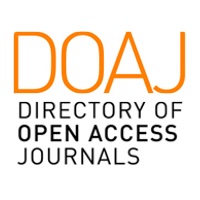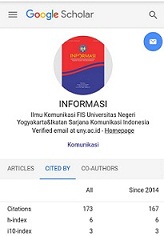The power of social media in BERLIBUR as new social movement in West Bandung Regency Indonesia
DOI:
https://doi.org/10.21831/informasi.v50i2.30149Keywords:
Social Media, New Social Movement, Community, Berlibur, Garbage Collection MovementAbstract
Social media has a tremendous power to drive community participation in development. This is evidenced by Berlibur (bebersih keliling lembur) "˜Cleaning Our Surroundings', a program that have been successfully held regularly by many communities in West Bandung Regency. Berlibur is a new social movement in West Bandung that is rooted from the concern of various communities about environmental cleanliness, particularly about the bad habit of littering. This study employed qualitative method with case study approach to describe how the power of social media can drive community participation in this independent environmental cleaning up program. The results showed that the form and the content of social media as well as the character of the audience become the key factor in the success of communication of the initiators of Berlibur. Various communities with different backgrounds are united in Komunitas Lintas KBB "˜All West Bandung Regency Communities' to collect garbage to positively exemplify and unconsciously grow the community awareness of throwing garbage properly.
References
Abercrombie, N. (2010). Kamus sosiologi. Yogyakarta: Pustaka Pelajar.
Badan Pengembangan dan Pembinaan Bahasa. (2016). KBBI Daring. Retrieved August 8, 2019, from Kementerian Pendidikan dan Kebudayaan Republik Indonesia website: https://kbbi.kemdikbud.go.id
Bakardjieva, M. (2005). Internet society: The internet in everyday life. London: Sage Publications.
Creswell, J. W. (2013). Qualitative inquiry & research design: Choosing among five approaches. Thousand Oaks: Sage.
Donk, W. van de, Brian, D. L., G.Nixon, P., & Rucht, D. (2004). Cyberprotest: New media, citizens, and sosial movement. Retrieved from https://www.researchgate.net/publication/287485057_Cyberprotest_New_media_citizens_and_social_movements
Giddens, A. (1993). Sociology. Cambridge: Polity Press.
Giugni, M. G. (1998). No title"Was it worth the effort? The outcomes and consequences of social movements. Annual review of sociology, 24(1), 371–393. https://doi.org/https://doi.org/10.1146/annurev.soc.24.1.371
Goffman, E. (1974). Frame analysis: An essay on the organization of experience. NewYork: Harper & Row.
Jamiluddin, R. M. (2005). Tipologi pesan persuasif. Jakarta: Indeks.
Klinken, G. van. (2007). Perang kota kecil. Jakarta: Yayasan Obor.
Maharsi, J. (2019). Berlibur ala komunitas di Bandung Barat, jaring 6 ton sampah di Curug CImahi. Retrieved from https://komunita.id/2019/01/07/berlibur-ala-komunitas-di-bandung-barat-jaring-6-ton-sampah-dari-curug-cimahi/
Nash, J. (2005). Social movements, an anthropological reader. Oxford: Blackwell Publishing Ltd.
Nugroho, A. (2017). Komunitas muda urban mengelola sampah: Kajian partisipatoris gerakan peduli sampah nasional di Kota Yogyakarta. Jurnal Pemikiran Sosiologi, 4(1), 106–119. Retrieved from file:///D:/DISERTASI/Gerakan Sosial/23633-46307-1-SM.pdf
Pedersen, K., & Mette. (2017). Digital ethnography and critical discourse analysis of the zero waste movement on social media. In Malmo University Electric Publishing. Malmo University.
Pichardo, N. A. (1997). New social movements: A critical review. Annual review sociology, 23(1).
Porta, D. D. (2013). Can democracy be saved? Participation, deliberation, and social movement. Cambridge, UK: Polity Press.
Rai, B. (2015). New social movements in India: An aspect of environmental movements. International Journal of Science and Research (IJSR), 4(9), 1918–1921.
Rakhmat, J. (2018). Psikologi komunikasi (Revision; T. Surjaman & R. K. Soenendar, Eds.). Bandung: Simbiosa Rekatama Media.
Sari, C. W. (2019). Berlibur, aksi bersih-bersih sampah KBB. Retrieved from https://www.pikiran-rakyat.com/bandung-raya/2019/08/28/berlibur-aksi-bersih-bersih-sampah-kbb
Scott, A. (1990). Ideology and the new social movements. UK: Unwin Hyman.
Singh, R. (2001). Social movements, old and new, a post-modernist critique. New Delhi: Sage Publication.
Sugiyono. (2016). Memahami penelitian kualitatif. Bandung: Alfabeta.
Suharko. (2005). Merajut demokrasi, hubungan NGO, pemerintah, dan pengembangan tata pemerintahan demokratis (1966-2001). Yogyakarta: Tiara Wacana.
Suharko. (2006). Gerakan sosial baru di Indonesia: Repertoar gerakan petani. Jurnal Ilmu Sosial Dan Ilmu Politik, 10(1–34). https://doi.org/https://doi.org/10.22146/jsp.11020
Yin, R. K. (2014). Studi kasus: Design dan metode. Jakarta: Raja Grafindo Persada.
Zeus, J. H., & Reif, K. (2007). Evolution of environmental attitudes in the european community. Scandinavian Political Studies, 13(2), 119–146.
Downloads
Published
Issue
Section
License
Authors who publish with this journal agree to the following terms:- Authors retain copyright and grant the journal right of first publication with the work simultaneously licensed under a Creative Commons Attribution License that allows others to share the work with an acknowledgement of the work's authorship and initial publication in this journal.
- Authors are able to enter into separate, additional contractual arrangements for the non-exclusive distribution of the journal's published version of the work (e.g., post it to an institutional repository or publish it in a book), with an acknowledgement of its initial publication in this journal.
- Authors are permitted and encouraged to post their work online (e.g., in institutional repositories or on their website) prior to and during the submission process, as it can lead to productive exchanges, as well as earlier and greater citation of published work (See The Effect of Open Access).





















